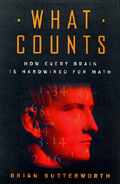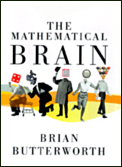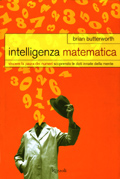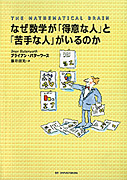Academic Journals
|
- Butterworth, B. (1975)
- Hesitation and semantic planning in speech. (PDF)
- Journal of
Psycholinguistic Research, 4, 75-87.
- Shallice, T. & Butterworth, B. (1977)
- Short-term memory impairment and
spontaneous speech.
- Neuropsychologia, 15,
729-35.
- Butterworth, B., Hine, R. & Brady, K. (1977)
- Speech and interaction in sound-only communication channels.
- Semiotica, 20, 81-99.
- Butterworth, B. (1978)
- Maxims for studying conversations. (PDF)
- Semiotica, 24,
217-229.
- Butterworth, B. (1979)
- Hesitation and the production of verbal paraphasias and neologisms
in
jargon aphasia. (PDF)
- Brain and Language, 8,
133-161.
- Beattie, G. & Butterworth, B. (1979)
- Contextual probability and word-frequency as determinants of pauses
in spontaneous speech. (PDF)
- Language & Speech,
22, 201-221.
- Butterworth, B. (1979)
- Editorial.
- Linguistics (New
Series), 17, 1-5. (Unsigned).
- Butterworth, B. (1981)
- Speech errors: old data in search of new theories.
- Linguistics, 19,
627-662.
- Butterworth, B., Howard, D. & McLoughlin, P. (1984)
- The semantic deficit in aphasia: the relationship between
semantic errors in auditory comprehension and picture naming.
- Neuropsychologia, 22,
409-426.
- Campbell, R. & Butterworth, B. (1985)
- Phonological dyslexia and dysgraphia in a highly literate
subject: a developmental case with associated deficits of phonemic
processing and awareness.
- Quarterly Journal of
Experimental Psychology, 37A, 435-475.
- Butterworth, B. (1985)
- Editorial.
- Language and Cognitive
Processes, 1, 1 (Unsigned).
- Butterworth, B., Campbell, R. & Howard, D. (1986)
- The uses of short-term memory: a case study. (PDF)
- Quarterly Journal of
Experimental Psychology, 38A, 705-737.
- Butterworth, B. & Howard, D. (1987)
- Paragrammatisms. (PDF)
- Cognition, 26, 1-37.
- Panzeri, M., Semenza, C. & Butterworth, B. (1987)
- Compensatory strategies in the evolution of severe jargon
aphasia.
- Neuropsychologia, 25,
919-933.
- Butterworth, B. (1988)
- Recent cross-language studies of aphasic speech.
- M.I.G. Bulletin. No. 2.
Australian Association
- of Speech and Hearing,
- Victoria.
- Butterworth, B. & Hadar, U. (1989)
- Gestures, speech and computational stages: a reply to McNeill.
- Psychological Review,
96, 168-174.
- Howard, D. & Butterworth, B. (1989)
- Short-term memory and comprehension:
a reply to Vallar and Baddeley (1987). (PDF)
- Cognitive
Neuropsychology, 6, 455-463.
- Butterworth, B., Panzeri, M., Semenza, C. & Ferreri, T. (1990)
- Paragrammatisms: a longitudinal study of an Italian
case. (PDF)
- Language and Cognitive
Processes, 5, 115-140.
- Semenza, C., Butterworth, B., Panzeri, M. & Ferreri, T. (1990)
- Word-formation: new evidence from aphasia.
- Neuropsychologia, 28,
499-502.
- Cipolotti, L., Butterworth, B. & Denes, G. (1991)
- A specific deficit for numbers in a case of dense acalculia.
- Brain, 114, 2619-2637.
- Butterworth, B. & Yin, W. G. (1991)
- Universal and language-specific features of reading:
- evidence from dyslexia in Chinese readers.
- Brain, 114, 2619-2637.
- Butterworth, B. & Yin, W. G. (1991)
- Universal and language specific features of reading:
- evidence from dyslexia in Chinese readers.
- Proceedings of the
Royal Society - Series B, 245, 91-95.
- Butterworth, B. (1991)
- Was Turner Dyslexic?
- Turner Studies, 11, 3-6.
- Butterworth, B. (1992)
- Disorders of phonological encoding. (PDF)
- Cognition, 42, 261-286.
- Semenza, C., Butterworth, B., Panzeri, M. & Hittmair-Delazer,
M. (1993)
- Derivational rules in apahasia
- Quaderni del Centro di
Studio per le Ricerche di Fonetica, XII ,
- 401-407.
- Butterworth, B. (1994)
- Regional specialities. (Commentary on M. Farah's target article:
- Neuropsychological inference with an interactive brain:
- A critique of the "locality assumption".
- Behavioral and Brain
Science, 17, 63.
- Cipolotti, L., Butterworth, B. & Warrington, E.K. (1994)
- From "One thousand nine hundred and forty-five" to 1000, 945.
- Neuropsychologia,
503-509.
- Vigliocco, G., Butterworth, B., Semenza, C. & Fossella, S.
(1994)
- How two aphasic speakers construct subject-verb agreement.
- Journal of
Neurolinguistics, 8, 19-25.
- Butterworth, B. (1994)
- Disorders of sentence production. (PDF)
- Philosophical
Transactions of the Royal Society
- Series B, 346, 55-61.
- Vigliocco, G., Butterworth, B. & Semenza, C. (1995)
- Constructing subject-verb agreement in speech:
- The role of semantic and morphological factors. (PDF)
- Journal of Memory &
Language, 34, 186-215.
- Cipolotti, L., Warrington, E., & Butterworth, B.(1995)
- Selective impairment in manipulating arabic
numerals. (PDF)
- Cortex, 31, 73-86.
- Butterworth, B. & Warrington, E. K. (1995)
- Two Routes to Repetition: Evidence from a
Case of 'Deep
Dysphasia'. (PDF)
- Neurocase. 1, 55-66.
- Butterworth, B. (1995)
- Editorial.
- Mathematical Cognition,
1, 1-2
- Wydell, T., Butterworth, B. & Patterson, K. (1995)
- The inconsistency of consistency effects in reading:
- The case of Japanese Kanji. (PDF)
- Journal of Experimental
Psychology:
- Language, Memory and
Cognition, 21, 1155-1168.
- Cipolotti, L. & Butterworth, B. (1995)
- Towards a multiroute model of number processing:
- impaired number transcoding with
- the preservation of calculation skills.
- Journal of Experimental
Psychology: General. 124, 375-390.
- Butterworth, B., Cipolotti, L. & Warrington, E.K. (1996)
- Short-term memory impairments and arithmetical ability.
- Quarterly Journal of
Experimental Psychology. 49A, 251-262.
- Vigliocco, G., Butterworth, B. & Garrett, M. F. (1996)
- Subject-verb agreement in Spanish and English:
- Differences in the role of conceptual constraints.
- Cognition, 61(3),
261-298.
- Delazer, M. & Butterworth, B. (1997)
- A dissociation of number meanings.
- Cognitive
Neuropsychology., 14, 613-636.
- Hadar, U. & Butterworth, B. (1997)
- Iconic gestures, imagery and word retrieval in speech.
- Semiotica. 115, 147-172.
- Yin, W. G. & Butterworth, B. (1998)
- Chinese pure alexia.
- Aphasiology, 12, 65-76.
- Zorzi, M., Houghton, G., & Butterworth, B. (1998)
- Two routes or one in reading aloud?
- A connectionist "dual-process" model.
- Journal of Experimental
Psychology:
- Human Perception and
Performance, 24, 1-31.
- Zorzi, M., Houghton, G., & Butterworth, B. (1998)
- The development of spelling-sound relationships
- in a model of phonological reading.
- Language and Cognitive
Processes.
- Sciama, S., Semenza, C., & Butterworth, B. (1999)
- Repetition priming in simple addition depends
- on surface form and typicality.
- Memory & Cognition.
27, 116-127.
- Wydell, T. N. & Butterworth, B. (1999)
- An English-Japanese bilingual with
monolingual dyslexia.
- Cognition, 70, 273-305.
- Butterworth, B. (1999)
- Perspectives : Neuroscience - A head for figures.
- Science 284: (5416) 928-929.
- Benke T, Hohenstein C, & Butterworth B (1999)
- An analysis of repetitive speech.
- Brain & Cognition, 40: (1) 14.
- Butterworth B, Grana A, Piazza M, Girelli, L, Price, C,
& Skuse, D. (1999)
- Language and the origins of number skills :
Karyotypic differences in Turner's syndrome.
- Brain & Language, 69: (3)
486-488.
- Cappelletti, M, Waley-Cohen, H, Butterworth, B,
& Kopelman, M (2000)
- A selective loss of the ability to read and write music.
- Neurocase, 6, 321-332.
- Benke, T, Hohenstein C, Poewe W, & Butterworth, B (2000)
- Repetitive speech phenomena in Parkinson's disease.
- Journal of Neurology, Neurosurgery
& Psychiatry, 69: (3) 319-325.
- Lochy A, Seron X, Delazer M, & Butterworth, B. (2000)
- The odd-even effect in multiplication :
Parity rule or familiarity with even numbers?
- Memory & Cognition, 28: (3) 358-365.
- Girelli L, Lucangeli D, & Butterworth, B. (2000)
- The development of automaticity in
accessing number magnitude,
- Journal of Experimental Child Psychology,
June: 76: (2) 104-122.
- Butterworth, B. (2001)
- What makes a prodigy? (PDF)
- Nature Neuroscience, 4 (1), 11-12
- Butterworth, B. (2001)
- Compass: Statistics : What seems natural?
- Science, 292, 853-854.
- Butterworth, B., Cappelletti, M., & Kopelman, M. (2001)
- Category specificity of reading and writing:
- the case of number words. (PDF)
- Nature Neuroscience, 4, 784-786.
- Benke, T. & Butterworth, B. (2001)
- Pallilalia and repetitive speech :
- two case studies.
- Brain & Language, 78, 62-81.
- Cappelletti, M., Butterworth, B., & Kopelman, M. (2001)
- Spared numerical abilities in a case of semantic dementia.
- Neuropsychologia, 39, 1224-1239.
- Butterworth, B., Zorzi, M., Girelli, L., & Jonckheere, A.R. (2001)
- Storage and retrieval of addition facts:
- The role of number comparison. (PDF)
- Quarterly Journal of Experimental
Psychology 54A (4) 1005 - 1029.
- Piazza, M., Mechelli, A., Butterworth, B., & Price, C. J. (2002)
- Are subitizing and counting implemented as separate
or
functionally overlapping processes? (PDF)
- NeuroImage, 15:(2), 435-446.
- Cappelletti, M., Kopelman, M., & Butterworth, B. (2002)
- Why semantic dementia drives you the dogs
(but not to
the horses): A theoretical account. (PDF)
- Cognitive Neuropsychology: 19: 483-503.
- Butterworth, B. (2002)
- Dyscalculia.
- Interplay: Summer: 44-47.
- Shibahara, N, Zorzi, M., Hill, M. P., Wydell, T. & Butterworth, B. (2003)
- Semantic Effects in Word Naming:
Evidence from English and Japanese Kanji. (PDF)
- Quarterly Journal of Experimental Psychology: 56A (2): 263 - 286.
- Bevan, A., Robinson, G., Butterworth, B., & Cipolotti, L. (2003)
- To play 'B' but not to say 'B' :
- Selective loss of letter names.
- Neurocase: 9: 118-128.
- Landerl, K., Bevan, A., & Butterworth, B. (2004)
- Developmental Dyscalculia and Basic Numerical Capacities :
- A Study of 8-9 Year Old Students. (PDF)
- Cognition: 93: 99-12.
- Butterworth, B. (2005)
- The development of arithmetical abilities (PDF)
- Journal of Child Psychology and Psychiatry: 46 (1): 3-18.
- Gelman, R. & Butterworth, B. (2005)
- Number and language : how are they related? (PDF)
- Trends in Cognitive Science: 9 (1): 6-10.
- Cappelletti, M., Kopelman, M.D., Morton, J., & Butterworth,
B. (2005)
- Disassociations in numerical abilities revealed
by progressive
cognitive decline in a patient with semantic dementia.
- Cognitive
Neuropsychology: 22 (7): 771-793
- Critchley, H.D., Tang, J., Glaser, D.E., Butterworth, B, &
Dolan, R.J. (2005)
- Anterior cingulate activity during error and autonomic response.
- Neuroimage: 27 (4):
885-895
- Rusconi, E., Walsh, V. & Butterworth, B. (2005)
- Dexterity with Numbers:
- rTMS Over Left Angular Gyrus Disrupts Finder Gnosis
and Number Processing.
- Neuropsychologia: 43
(11): 1609-1624
- Marinella Cappelletti, Brian Butterworth & Michael Kopelman (2006)
- The Understanding of Quantifiers in Semantic Dementia:
A Single-Case Study. (PDF)
- Neurocase 12: 136-145.
- Elena Rusconi, Bonnie Kwan, Bruno L. Giordano,
Carlo Umiltà
& B. Butterworth (2006)
- Spatial representation of pitch height:
the SMARC effect. (PDF)
- Cognition 99: 113-119.
- Fulvia Castelli, Daniel E. Glaser & Brian Butterworth (2006)
- Discrete and analogue quantity processing in the
parietal lobe: A functional MRI study. (PDF)
- Proceedings of the National Academy of Sciences of the USA:
Vol. 103 Number 12: 4693-4698.
- Paterson, S.J., Girelli, L., Butterworth, B., & Karmiloff-Smith, A. (2006)
- Are numerical impairments syndrome specific?
- Evidence from Williams Syndrome and Down's
Syndrome. (PDF)
- Journal of Child Psychology & Psychiatry 47: 2: 190-204.
- J. Tang, H. D. Critchley, D. E. Glaser, R. J. Dolan,
& B. Butterworth (2006)
- Imaging Informational Conflict: A Functional Magnetic
Resonance Imaging Study of Numerical Stroop. (PDF)
- Journal of Cognitive Neuroscience 18: 12: 2049-2062.
- Noam Sagiv, Julia Simner, James Collins, Brian Butterworth
& Jamie Ward
(2006)
- What is the relationship between synaesthesia and
visuo-spatial number forms? (PDF)
- Cognition 101: 114-128.
- Manuela Piazza, Andrea Mechelli, Cathy J. Price
- & Brian
Butterworth (2006)
- Exact and approximate judgements of visual
and auditory numerosity: an fMRI study. (PDF)
- Brain Research 1106: 177-188.
- Koh, P. H., Glaser, D. E., Flandin, G., Butterworth, B.,
Maki, A.,
Delpy, D., et al. (2007).
- Functional Optical Signal Analysis (fOSA):
A Software Tool
for NIRS Data Processing Incorporating
Statistical Parametric Mapping (SPM).
(PDF)
- Journal of Biomedical Optics 12(6),
- 064010-064011 - 064010-064013.
- Butterworth, B. (2007).
- Why frequencies are natural. (PDF)
- Behavioral and Brain Sciences. 303: 259.
- Cappelletti, M., Jansari, A., Kopelman, M., & Butterworth, B. (2008).
- A case of selective impairment of encyclopaedic numerical
knowledge or "when December 25th is no longer
Christmas day, but '20 + 5' is still 25". (PDF)
- Cortex, 44(3), 325-336.
- Tang, J., Ward, J., & Butterworth, B. (in press)
- Number forms in the brain. (PDF)
- Journal of Cognitive Neuroscience.
- Ward, J., Collins, J., Sarri, M., Sagiv, N., & Butterworth, B. (in press)
- Synaesthesia, Number Forms and Difficulties in Arithmetic.
- Cortex.
|









